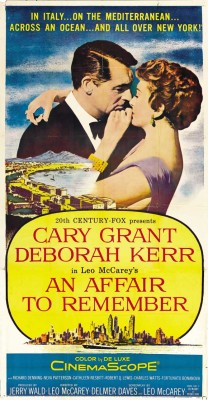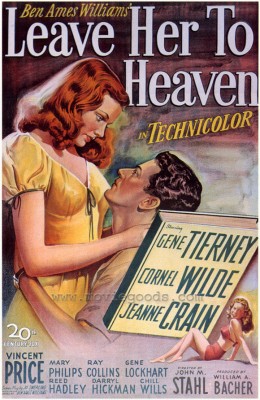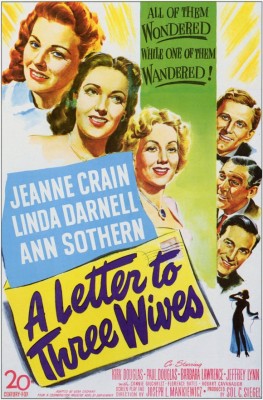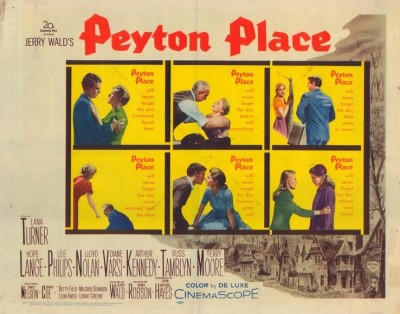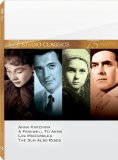| Reviews & Columns |
|
Reviews DVD TV on DVD Blu-ray 4K UHD International DVDs In Theaters Reviews by Studio Video Games Features Collector Series DVDs Easter Egg Database Interviews DVD Talk Radio Feature Articles Columns Anime Talk DVD Savant Horror DVDs The M.O.D. Squad Art House HD Talk Silent DVD
|
DVD Talk Forum |
|
|
| Resources |
|
DVD Price Search Customer Service #'s RCE Info Links |
|
Columns
|
|
|
20th Century-Fox Studio Classics - An Affair to Remember / Leave Her to Heaven / A Letter to Three Wives / Peyton Place
Fox Home Entertainment, meanwhile, recently launched its own rather blatantly imitative line of similarly packaged quadruple features, and for even less money. Where the TCM titles retailed for $27.98, these have an RSP of $19.98, less than $5 apiece for DVDs that used to cost that amount for a single film.
And, for the most part, these are the very same DVDs with the same abundance of extra features, often several hours worth per film: audio commentaries, AMC Backstory episodes, original featurettes. If you've waited this long to start a classic film library, now's a good time to start.
Officially, these releases coincide with 20th Century-Fox's 75th Anniversary. Finding them at your local retailer or even on-line may not be easy, however. The sets apparently fall under the banner of 20th Century-Fox Studio Classics - 75 Years but they don't seem to be listed on Amazon, and good luck finding them at places like Best Buy, where employees consider There's Something About Mary a classic oldie. Addendum: Helpful readers on DVD Talk's discussion boards offer this link. Why this would be searchable under "Classic Quad" is anyone's guess. This untitled set is linked by romance and intrigue, I suppose, as it includes An Affair to Remember (1957), Leave Her to Heaven (1945), A Letter to Three Wives (1949), and Peyton Place (1957).
An Affair to Remember is probably the best-known film of this bunch. It had a kind of modest underground following of female film fans, then it nearly joined the ranks of mainstream classics like The Wizard of Oz and Gone with the Wind following the 1993 release of Sleepless in Seattle, the Tom Hanks-Meg Ryan romantic comedy/semi-remake whose script intertwines with the earlier film throughout. According to one source, Sleepless's success rubbed off on An Affair to Remember in a big way, prompting the sale of two million units of the film on VHS.
Leo McCarey's 1957 film is itself a remake of his 1939 classic Love Affair, which starred Charles Boyer and Irene Dunne, and which was again remade, also as Love Affair (1994) by director-star Warren Beatty.
The 1957 version stars Deborah Kerr as Terry McKay, a mannered, sophisticated woman engaged to be married. Aboard the SS Constitution she meets Nickie Ferrante (Cary Grant), a notorious playboy himself engaged. Despite this the two gradually fall in love but, she feeling guilty about their liaison, they decide to separate, agreeing to reunite at the top of the Empire State Building in six months time should their other relationships be ended.
(Spoilers ahead) O bitter irony. Six months later, just as she arrives at the foot of the Empire State Building, Terry is struck by an automobile and unable to make her rendezvous. Can the two star-crossed lovers be reunited?
Despite its popularity - it ranked sixth in an AFI poll of "America's Greatest Love Stories" (regardless of its Bristol- and Glasgow-born stars) - An Affair to Remember is pure '50s schmaltz. Kerr, whom Hollywood typecast as the virginal if determined schoolmarm/nun type tempted by forbidden fruit (her casual adulteress role in From Here to Eternity notwithstanding) has a career-defining role in this, despite better parts in better films. Grant, on the other hand, is badly miscast, much more believable as a rake than as the super-sensitive and introspective character he becomes by this film's final reels. The film plays against the actors' natural charms, with Kerr's intelligence replaced by too much whining and Grant's breezy charm suffocated in angst. (*** out of *****)
Extra Features: Audio commentary by singer Marni Nixon (her named misspelled on the menu screens) and Joseph McBride; AMC Backstory; trailer; still gallery.
Based on Ben Ames Williams's novel, Leave Her to Heaven is an ice-cold thriller in brilliant Technicolor, about an unhinged woman's increasingly possessive behavior toward various relatives she imagines standing between her and her husband. Its impact, no doubt numbing in 1945, is considerably lessened today only because of the glut in recent years of thrillers about psychotic women-turned-serial killers, particularly after the success of the similar Fatal Attraction (1987). The picture also gets bogged down in a courtroom anticlimax, featuring an atypically uncharismatic though florid performance by Vincent Price as a District Attorney.
That said, the film's portrait of conniving beauty Ellen Berent (Gene Tierney) retains its unsettling psychological authenticity, and one murder in the film still ranks among the creepiest in all of cinema.
Novelist Richard Harland (Cornel Wilde) is introduced to Ellen aboard a train, where they both meet up with Richard's attorney, Glen Robie (Ray Collins), Ellen's adopted sister, Ruth (Jeanne Crain) and mother (Mary Philips). The two are immediately attracted to one another, but Ellen rushes their relationship, first removing her engagement ring from another man (Price) then announcing her plans to marry Richard before they've even had a chance to discuss it. There are ominous signs from the beginning, such as Ellen's unhealthy attachment to her late father (whom Richard closely resembles) and other clues.
The film's most famous scene is a murder that takes place in the middle of a placid lake in the light of day. Without revealing too much, its extreme effectiveness is due partly to this contrast: an exceptionally cold and cruel murder of someone helpless and innocent in peaceful surroundings. There's no ominous underscoring and even the murder itself is passively committed.
The film is also noteworthy for its gorgeous Technicolor photography (by Leon Shamroy) and art direction (credited to Maurice Ransford and Lyle R. Wheeler). Set mostly in New England and the American Southwest, the lavish production design accentuates the architectural contrasts and many of the sets have full ceilings, maybe the most since Citizen Kane. (****)
Extra Features: Audio commentary by Darryl Hickman and Richard "I Hate My Job Almost As Much as I Hate You" Schickel; two Fox Movietone newsreel excerpts; a trailer.
Based on John Klempner's novel A Letter to Five Wives, Joseph Mankiewicz's A Letter to Three Wives (1949) is a somewhat dated but still fascinating look at early postwar women with an ingenious premise.
Shortly after arriving to assist a school outing for their Westchester County, New York community, three married women receive a letter addressed to all from Addie Ross (voiced by an uncredited Celeste Holm) stating she has left town with one of their husbands, knowing it will be hours before the man's identity can be known.
The wealthy women try to act nonchalant, but each fears for their marriage. Deborah (Jeanne Crain), in the first of three extended flashbacks preceded by eerie voicebox audio effects, recalls her struggle to adapt to the country club set to which her husband (Jeffrey Lynn) belongs, she having come from unpretentious, unsophisticated rural America.
Career woman Rita (Ann Sothern), who writes radio scripts, remembers a disastrous dinner party she held for her demanding, unctuous boss, a grating personality Rita's schoolteacher husband (Kirk Douglas) despises.
Finally, Lora Mae (Linda Darnell) recalls her coldly calculating efforts to goad Porter (Paul Douglas, in his film debut), the wealthy owner of a chain of department stores, into marrying her, he well aware of her gold-digging motives and desire of the financial security he offers.
The film's portrait of strong women emboldened by their service during the war (Deborah was a WAC, for instance) and for other reasons, plus the film's anticipation of the upwardly mobile exodus to wealthy, pretentious suburbs is impressive; the film even contains an amusing reference to the sweeping popularity of commercial television. The performances are delightful across the board, especially Darnell and Douglas (who'd reprise their characters in several subsequent radio adaptations) and Thelma Ritter as Sothern's unsophisticated maid. (****)
Extra Features: Audio commentary by Kenneth Geist, Cheryl Lower, and Christopher Mankiewicz; an A&E Biography entitled "Linda Darnell: Hollywood's Fallen Angel"; a Fox Movietone newsreel excerpt; and a trailer.
Deliciously lurid soaper based on Grace Metalious's runaway bestseller, Peyton Place amazingly retains almost all the original novel's taboo subjects: abortion, illegitimacy, incest, rape, murder, this despite a slowly crumbling but still powerful Production Code. Though at times over the top in the Douglas Sirk manner, it's also an interesting attempt to peek behind the closed doors of a seemingly idyllic New England community, here called Peyton Place.
Though fading beauty Lana Turner is top-billed, Peyton Place in a sense is itself the star of the film; it's really an ensemble picture that today resembles the ensemble television dramas of recent years with their labyrinthine character relationships and season-long character arcs. Turner is sexually repressed Constance MacKenzie, a respected dress shop owner and widow raising her high-school-age daughter, Allison (Diane Varsi). Allison's best friend is Selena (Hope Lange), literally from the other side of the tracks, where her alcoholic stepfather (Arthur Kennedy) sexually abuses her. Allison is attracted to wholesome, shy kid Norman Page (Russ Tamblyn, in an excellent, understated performance). In the book Norman, like the Norman in Hitchcock's Psycho, is completely dominated by a controlling mother who in the book but not the film bathes her nearly adult son. An unhealthy relationship is nevertheless implied.
The pot gets stirred when a progressive, assertive high school principal comes to town. Michael Rossi (Lee Philips) is also drawn to a resistant Constance. Other subplots are introduced, including bad girl Betty Anderson (Terry Moore) and her relationship with Rodney Harrington (Barry Coe), son of the town's leading conservative (Leon Ames).
Though I was never much a fan of Lana Turner, and hers is very '50s-type characterization, the sort of thing John Waters would later lampoon in movies like Polyester (1981), the other performances are compelling and nicely underplayed, particularly by Lloyd Nolan, excellent as the town's compassionate local doctor, while Lange and Moore are also quite good as sensitive teenagers.
Though somewhat trashy and at times bordering on camp, Peyton Place is undeniably compelling entertainment that still impresses for acknowledging with surprising explicitness a darker side of small town Americana. (****)
Extra Features: Audio commentary by Russ Tamblyn and Terry Moore; AMC Backstory; trailer (teaser and general release) two Fox Movietone newsreel excerpts.
Video & Audio
In short, all the films look great. An Affair to Remember and Peyton Place are presented in their original CinemaScope aspect ratios with 16:9 enhancement, with impressive Dolby versions of their original four-track magnetic stereo soundtracks, which in both cases are extremely impressive. Leave Her to Heaven is a near-perfect three-color Technicolor presentation; I noticed just one shot, a dissolve, where the color matrixes weren't perfectly aligned. It and the black and white A Letter to Three Wives are in their original full frame ratios with good mono audio.
All four features include optional English and Spanish subtitles. An Affair to Remember includes a four-track stereo French track and a monophonic Spanish one, while Peyton Place has mono French and Spanish tracks; Leave Her to Heaven also includes a Spanish track.
The discs are all single-sided and dual-layered with the exception of Peyton Place, which is a flipper disc with most of the extras on Side B.
Extra Features
See above.
Parting Thoughts
This is a real bargain even if you already own two of the four films included in this set. All four films are worthwhile and most are loaded with extra features. How can it miss? Highly Recommended.
Stuart Galbraith IV's latest audio commentary, for AnimEigo's Musashi Miyamoto DVD boxed set, is on sale now.
|
| Popular Reviews |
| Sponsored Links |
|
|
| Sponsored Links |
|
|
| Release List | Reviews | Shop | Newsletter | Forum | DVD Giveaways | Blu-Ray | Advertise |
|
Copyright 2024 DVDTalk.com All Rights Reserved. Legal Info, Privacy Policy, Terms of Use,
Manage Preferences,
Your Privacy Choices | |||||||









